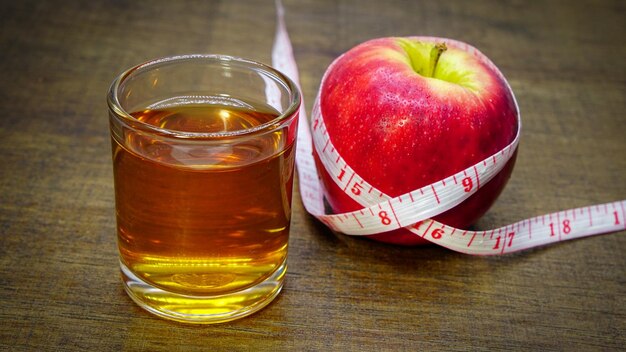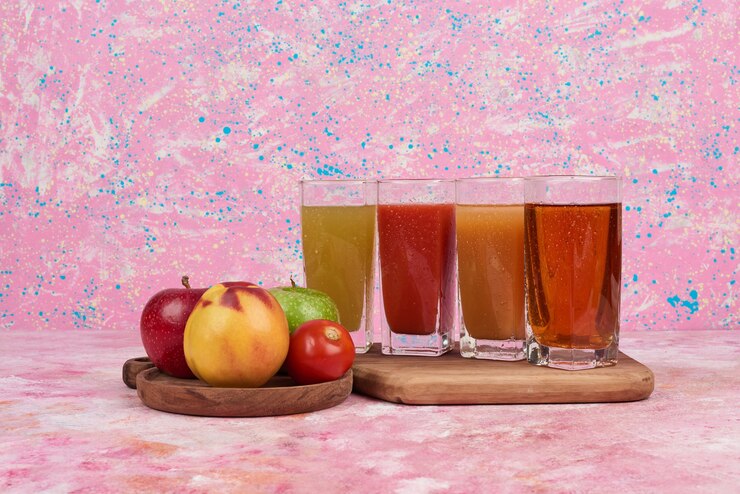Apple juice is a beloved beverage in the U.S., often regarded as a refreshing and healthy choice. People commonly think of it as a natural drink, full of vitamins and nutrients. It’s easy to see why it is popular, with its sweet taste and refreshing quality. But is apple juice really good for you? While it has some health benefits, it’s important to consider both the pros and cons.
This article will explore the nutritional value, its health benefits, its potential risks, and whether it’s a good choice for children. We’ll base our discussion on scientific evidence to give you a clear understanding of what it offers.
Nutritional Value
Apple juice provides essential vitamins and minerals, including vitamin A, vitamin C, and potassium. Vitamin C is vital for immune function and skin health. Potassium helps regulate blood pressure and supports heart health. It is also a source of antioxidants, which help protect the body from oxidative stress.
Calories and Sugar Content
It does contain a lot of sugar. A typical serving has around 24 grams of sugar, which is more than what you might find in a serving of other fruit juices, such as orange juice. This high sugar content can contribute to weight gain and other health problems if consumed in large amounts. It’s important to be mindful of the portion sizes when drinking it.
Health Benefits
While apple juice has some nutritional value, it also provides several health benefits, particularly when consumed in moderation.
Rich in Vitamin C and Antioxidants
Apple juice is an excellent source of vitamin C. This vitamin is essential for a healthy immune system and can help prevent colds. Vitamin C also plays a role in maintaining healthy skin by supporting collagen production. Additionally, it contains antioxidants, which help protect cells from damage caused by free radicals, contributing to overall health and aging.
Hydration and Energy Boost
It can help keep you hydrated, which is essential for maintaining energy levels throughout the day. The natural sugars in it provide a quick energy boost, making it a good option for a mid-day pick-me-up.
Supports Heart Health
The potassium found in it plays a significant role in heart health. It helps lower blood pressure by balancing out the effects of sodium in the body. Regular consumption of potassium-rich foods like apple can reduce the risk of stroke and heart disease.
Improves Digestion
Unfiltered apple juice, which contains more pulp, provides dietary fiber. Fiber is essential for digestive health and helps prevent constipation. The fiber in this juice promotes a healthy gut, making it a good addition to a diet focused on digestion.
Apple Juice for Weight Loss

It can be part of a healthy diet, but it’s essential to understand how it fits into a weight-loss plan.
Can Apple Juice Help You Lose Weight?
While this juice is low in fat, it is not particularly low in calories. It can be included in a weight management plan, but moderation is key. It should be consumed as part of a balanced diet that includes plenty of fruits, vegetables, and other healthy beverages.
Apple cider vinegar, another apple-based product, is sometimes marketed as a weight-loss aid. However, it doesn’t have the same strong evidence supporting its weight loss benefits.
Sugar Content and Weight Gain
The high sugar content in it can lead to weight gain if consumed in excess. Sugar is a source of empty calories, meaning it provides energy but few other nutrients. Excessive sugar intake can cause insulin spikes, which can lead to fat storage and weight gain. Moderating its intake is important for those managing their weight.
Potential Drawbacks
While it offers health benefits, there are some risks that should not be ignored.
High Sugar Content: The Risks
One of the most significant concerns about apple juice is its high sugar content. Many commercially available apple juices are sweetened further with added sugars. This increases the overall calorie count and can contribute to health issues like obesity, diabetes, and heart disease.
It also has a high glycemic index (GI), which means it can cause rapid spikes in blood sugar levels. These spikes can lead to energy crashes and long-term metabolic problems if consumed frequently.
Risk of Cavities and Tooth Decay
Apple juice, like other fruit juices, is acidic. This acidity can weaken tooth enamel over time, leading to cavities and other dental issues. Drinking it frequently, especially without rinsing your mouth afterward, can increase the risk of tooth decay.
Lack of Fiber in Processed Apple Juice
Most commercial apple juices are processed, meaning they’ve been stripped of the natural fiber found in whole apples. Fiber is essential for digestive health, helping to regulate bowel movements and promote gut health. If you’re looking to get the full benefits of apples, eating the whole fruit is a better option than drinking processed apple juice.
Is Apple Juice Healthy for Kids?
It is often given to children, but it’s important to understand how it affects their health.
Pros and Cons
It can provide important nutrients for children, including vitamin C, potassium, and antioxidants. However, it is essential to limit their intake. Too much of it can contribute to obesity and other health problems due to its high sugar content.
Pediatricians recommend that children under one year of age avoid fruit juices altogether. For older children, it’s important to stick to a moderate serving size to prevent health issues.
Organic vs. Conventional Apple Juice
When choosing the juice for children, consider opting for organic options. Organic apple juice typically contains fewer pesticides and chemicals, making it a safer option for young ones. Always read the labels to ensure the juice is free from added sugars and artificial additives.
How to Choose the Best Apple Juice?
When it comes to its selection, the options can be overwhelming. Here’s how to make the healthiest choice for your body.
The Importance of Choosing 100% Pure Apple Juice
The best apple juice is 100% pure apple juice, meaning it contains no added sugars, preservatives, or artificial additives. Pure juice retains all the natural benefits of apples, including vitamins, antioxidants, and minerals. In contrast, apple juice drinks or concentrates often contain added sugars and flavors, reducing their nutritional value. These drinks can be loaded with empty calories, which can lead to unwanted weight gain.
Look for labels that state 100% purity and avoid those with phrases like “from concentrate,” which indicate a more processed product. When choosing juice, also check that it has no added sugars or preservatives. These extra ingredients diminish the health benefits and can contribute to long-term health issues like diabetes or heart disease.
Fresh Pressed vs. Bottled Apple Juice
Another important consideration is whether to choose fresh-pressed or bottled apple juice. Fresh-pressed juice often has a richer taste and retains more nutrients. This is because it is made without the high heat used in pasteurization, which can destroy some of the beneficial compounds, like vitamin C and certain antioxidants.
On the other hand, bottled apple juice, particularly mass-produced varieties, undergoes pasteurization, a process that involves heating to kill bacteria and extend shelf life. While this can reduce the juice’s nutritional value, it’s still safe to drink.
Fresh-pressed juice may be available in local markets or specialty stores. If you want to preserve the maximum nutrients, opt for fresh-pressed juice, though keep in mind that it often has a shorter shelf life than bottled varieties.
Apple Juice vs. Other Fruit Juices
Apple juice is not the only fruit juice on the market, and it’s important to know how it compares to other popular choices.

How Does Apple Juice Compare to Orange or Grape Juice?
In terms of nutritional content, apple juice is similar to orange juice and grape juice, but each offers unique benefits. For example, orange juice is typically higher in vitamin C, which is excellent for immune support, while grape juice contains more antioxidants like resveratrol, which may support heart health.
However, apple juice tends to have lower sugar levels compared to grape juice, making it a better option for those monitoring their sugar intake. The sugar content in apple juice is still high, so it’s important to drink it in moderation.
Apple Juice as a Source of Antioxidants vs. Green Juices
In comparison to green juices, apple juice contains fewer nutrients, particularly fiber. Green juices, which are made from vegetables like kale, spinach, and celery, are typically low in sugar and high in fiber and micronutrients.
These juices are great for supporting digestive health and keeping your energy levels stable throughout the day. While it can offer some antioxidants, green juices are a better choice if you’re looking for a nutrient-dense drink that’s low in sugar.
If you’re aiming for weight management or better digestion, green juice might be a healthier choice over fruit juices, which can lead to sugar spikes. Nonetheless, it is still a tasty and enjoyable option if consumed in moderation.
How Much Apple Juice Should You Drink a Day?
While it can be a healthy addition to your diet, drinking it in the right amounts is key to reaping its benefits without overdoing the sugar.
Recommended Serving Sizes
The general recommendation is to limit its intake to one small glass (about 4 to 6 ounces) per day. This size provides a decent amount of nutrients without overwhelming your body with too much sugar.
It’s important to remember that it is also calorie-dense and contains a significant amount of sugar. By drinking it in moderation, you can enjoy its benefits without the negative impacts of excess sugar.
When to Avoid It?
Certain individuals should be cautious when consuming it. People with diabetes or those managing their weight should pay special attention to their apple juice intake. The high sugar content can cause blood sugar spikes, which can be harmful to individuals with diabetes. If you’re trying to lose weight, it’s better to stick to smaller servings or replace it with other beverages like water or unsweetened herbal tea.
If you have any health conditions or concerns, consult with your doctor or nutritionist before adding it to your daily routine.
FAQs
Is apple juice good for your immune system?
Yes, apple juice can support the immune system due to its vitamin C content, which is essential for immune function. However, it’s important to consume it in moderation, as high sugar levels can outweigh its benefits.
Can apple juice cause weight gain?
Yes, drinking too much apple juice can contribute to weight gain due to its high sugar and calorie content. Excess sugar can lead to increased fat storage, especially if consumed in large quantities without balancing overall calorie intake.
Is it better to drink apple juice or eat an apple?
Eating a whole apple is better because it provides fiber, which promotes digestion and satiety. Apple juice lacks fiber, causing quicker sugar absorption and fewer long-lasting health benefits compared to the whole fruit.
Is apple juice good for skin health?
Apple juice contains antioxidants like vitamin C, which can help protect the skin from oxidative stress, promoting collagen production and overall skin health. However, drinking in excess can lead to skin issues due to high sugar content.
Conclusion
Apple juice has both benefits and drawbacks. It’s rich in essential vitamins and antioxidants, offers hydration, and supports heart health. However, it also contains a high amount of sugar, which can contribute to weight gain, blood sugar spikes, and dental issues if consumed excessively. Opt for organic, 100% pure apple juice with no added sugars for the healthiest option. Keep in mind that moderation is key, and drinking it in moderation can be part of a healthy diet. For children, it’s best to limit its intake and prefer organic options.


